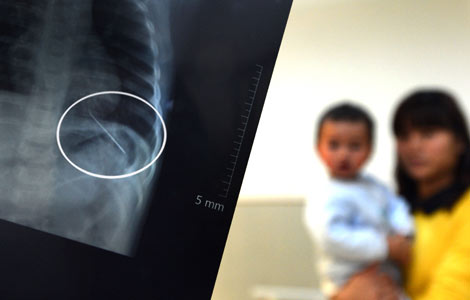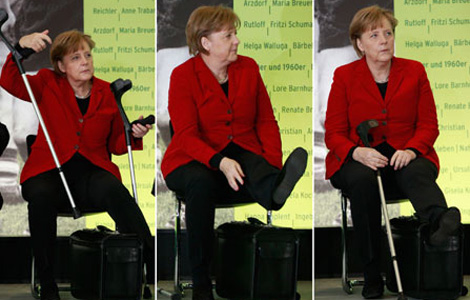New organ system 'not accessible' to public
Updated: 2014-01-08 00:20
By ZHAO HUANXIN and SHAN JUAN (China Daily)
|
||||||||
Big challenge to ensure that initiative works as intended, spokesman says
The country's fledgling distribution system for donated organs might "fall short of expectations", and medical institutions and supervisors are being urged to follow transplant regulations strictly to ensure fairness.
In September, China reacted to a shortage of organs for transplants and the problem of an organ black market by introducing a new rule and launching a national organ transplant response system.
The move is aimed at ensuring that organs available go to those most in need, said Mao Qun'an, spokesman for the National Health and Family Planning Commission.
The China Organ Transplant Response System, introduced on Sept 1, borrowed advanced expertise from overseas, but is currently inaccessible to the public, Mao said at a news conference in Beijing.
The computerized system, designed to help automatically distribute donor organs, is mandatory in 165 hospitals across the mainland that are allowed to perform human organ transplants.
Under the Regulation on the Procurement and Distribution of Donated Human Organs, no institution, organization or individual is allowed to distribute donated human organs without going through the system.
"It was designed to guarantee that organs could be distributed fairly," Mao said on Tuesday in answer to a China Daily question on the system's transparency.
But the system is likely to be unsatisfactory in its early stages, Mao said, adding that his commission has asked hospitals and management departments to follow strictly the rules regarding organ transplants.
"At present, the public is not able to participate in the system, but we have designed the system for the participation of professionals from various sources to watch the distribution process," he said.
Mao said it is a big challenge to ensure the system works as intended.
An organ transplant surgeon in Guangzhou, who declined to be named, said the fact that the allocation system is not open to patients could leave a loophole for corruption. "Some patients were told by doctors that they had been included on the waiting list in the system, but they had not," he said.
Wang Haibo, director of the China Organ Transplant Response System at the University of Hong Kong, said the number of organs distributed through the national system since it was launched has reached 700, nearly equal to the total registered during its three-year trial.
Wang said he has received calls inquiring about the proper use of the system from hospitals authorized to conduct transplants.
"We are analyzing the questions and feedback from hospitals concerning the system to figure out ways to improve it," he told China Daily.
To enhance the transparency and fairness of the computerized allocation system, "we are considering a new approach to patient notification," he said.
Patients would receive a short message from the system management team telling them that they had been put on the waiting list for a matching donor organ.
But Wang did not give a timetable for this initiative.
He said many donor organ allocation systems in industrial countries e-mail patients about their status on the waiting list.
Zhu Jiye, director of the liver and gallbladder surgical department at Peking University People's Hospital, said that publicizing the waiting list under the system might infringe on patients' privacy.
Zhu also suggested that the system be expanded to cover organ donations from executed prisoners.
Only organs donated by the public after death are currently covered, following the nationwide public organ donation system set up in 2010.
"Death-row inmates have the right to donate organs, and the system could help ensure a fair and transparent use of such donations," Zhu said.
Statistics from the National Organ Donation Management Center under the Red Cross Society of China show that there were 734 donations involving 1,983 organs on the mainland in 2013.
The Red Cross is responsible for promoting and witnessing organ donations by the public and commemorating the donors.
China has the second-highest demand for organ transplants after the United States. An estimated 300,000 patients need organ transplants every year, but fewer than 10,000 receive transplants, according to Chinese media reports.
Contact the writers at zhaohuanxin@chinadaily.com.cn and shanjuan@chinadaily.com.cn
- System for organ donors tested
- Wuhan may process organ donation registratioin online
- Brain-dead boy's organs donated to 5 recipients
- Guangdong to publish organ procurement agencies
- New rule for organ distribution in China
- Reform system of organ donations
- Regulations improve organ donor system
- Donors of organs easing transplant shortages

 Pollution's effect on health not clear yet, officials say
Pollution's effect on health not clear yet, officials say
 Russia imposes security clampdown in Sochi before Olympics
Russia imposes security clampdown in Sochi before Olympics
 X-ray reveals crying toddler had 5-cm needle inserted in his lung
X-ray reveals crying toddler had 5-cm needle inserted in his lung
 Tokyo urged to end militarism
Tokyo urged to end militarism
 Military drill in SW China
Military drill in SW China
 Rodman in DPRK with ex-NBA team
Rodman in DPRK with ex-NBA team
 Merkel breaks pelvis
Merkel breaks pelvis
 Trick photography
Trick photography
Most Viewed
Editor's Picks

|

|

|

|

|

|
Today's Top News
Staying ahead of the game
Odierno: US, China to work on issues
China is importing more US-built cars
Reform plan faces `challenges’: Professor
US jobless bill clears Senate hurdle
Solar firms face 'total eclipse' in US
Hong Kong Media mogul Shaw dies
Tokyo urged to end militarism
US Weekly

|

|






